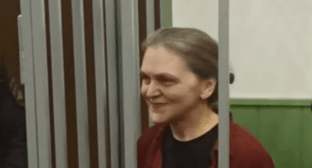08 November 2005, 20:25
Courtroom unrest
The trial began after a one-hour delay. Eight witnesses and two victims came to the trial, summoned to give evidence. Today's hearing was remarkable for "high attendance": there were around 40 people in the courtroom. Among them were representatives of the Beslan Mothers Committee and other victims who had regularly attended the trial.
During the trial, journalists heard the evidence of the witnesses and victims "in part": court officials have more than once referred to technical malfunction when audio or video signal is lost in the separate room for the press.
Meanwhile, Beslan residents are obviously losing interest in the personality of Mr Kulayev, the defendant.
Interrogation of the eight witnesses continued for fewer than two hours: the people gave the same answers to questions: "I didn't see" or "I don't know". For that reason, victims in the courtroom became indignant because of the evidence of witnesses summoned for interrogation: "I lost my two children and I am now alone and I don't come here to listen to that," a victim said, angrily. "Why don't they summon the real witnesses of what was going on?"
"They are going to stage a revolution here now," prosecutor Maria Semisynov, a member of the prosecution at the trial, commented to a colleague of hers.
The courtroom saw unrest once the hearing was over. The journalists were asked not to enter the courtroom and not to stand near it, so that they do not hear anything. Those asking referred to an order "from the above."
"If agencies liked, they could find witnesses who saw everything," Taimuraz Chejemov, representative of the victims, explained the reason for disagreement to the journalists. "Instead, they summon people who don't know anything. This is just another game, understand that, and the women are resentful exactly of that. Kulayev is a farce staged by the prosecution, a mere frame-up."
Mr Chejemov showed lists of witnesses that included North Ossetia's ex-president Alexander Dzasokhov, former republican internal affairs minister Kazbek Dzantiyev, former republican health minister Alexander Soplivenko, and a number of other officials. Mr Chejemov is sure that "they will make up a reason to refuse to give evidence."
"I am just interested in the reaction of the prosecutors, how they will substantiate that," said the lawyer.
Nikolai Shepel, Deputy Prosecutor General of Russia, gave a terse report: "We are ready to listen to any evidence of victims and there are no obstacles for Dzasokhov, Dzantiyev, and others to give evidence."
Author: Regina Revazova, CK correspondent




